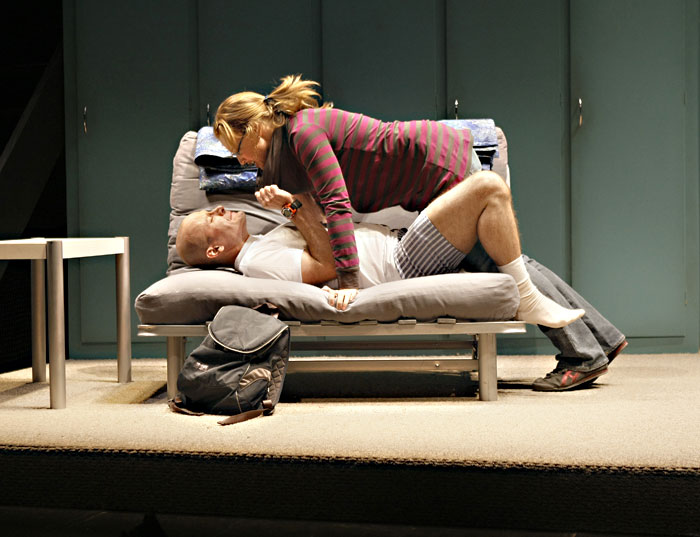When T.S. Eliot predicted the world would end “not with a bang but a whimper” he failed to anticipate that a fellow named Jules would be doing most of the whimpering, and that Seattle Rep’s boom—a play that orphans Superman for a second time—would be so riotously funny.
San Francisco playwright Peter Sinn Nachtrieb’s one-act comedy goes to work like Zoloft cut with Skittles. On one hand, boom cheerily addresses the eternal quandaries of who we are, why we’re here, whether we exist to fulfill a collective destiny, and why it all should matter. On a second, microcosmic level, it asks a question as contemporary as any eHarmony commercial: What the hell does it take to get laid in this town?
Here’s the plot: All surface life on Earth is doomed, and with minutes to ensure the survival of humanity by passing along his genes, Jules (Nick Garrison) tries to hook up via a Craigslist posting with promises of “intensely significant coupling.” But when Jo (Chelsey Rives) comes knocking on his bomb shelter door, Jules is, um, unable to deliver the goods—probably because he’s gay as a Pride parade. Meanwhile a ditzy deus ex machina named Barbara (Gretchen Krich) stops, starts, and manipulates the action from her perch over the stage with a tympani, a mixing board, and an assortment of levers. Combine these amusements and you have a very lively evening of theater that won’t leave you feeling bloated with Big Ideas or weigh you down with nagging concerns about human extinction.
Despite the most dire of subjects, the show is kept aloft by its own bonhomie and the sparkling chemistry of the cast. Garrison is able to convey gay without radiating fey as the hermetic scientist whose study of fish convinces him that an Earth-altering comet is mere moments from impact. And as an actor he has plenty to work with in the nebbish Jules. It’s a brainiac’s showcase, but Garrison invests the role with a rainbow of emotions. Rives is his steady foil as Jo, the redoubtable romantic conquest who declines to be used as a baby factory, even if it means the planet will be short about six billion people 15 minutes hence. He’s devious, she’s willful, and her street smarts make his command of facts and figures appear all the more impotent.
Krich plays Barbara as an off-her-meds Golden Girl, and as often as she’s reaching for the controls to tweak the action below, she’s also grasping the air for elusive words to make her point clear. Krich could give Audra Lindley a run for her money as the loopy Mrs. Roper on Three’s Company, swathed in something that resembles a ’70s fashionista’s take on the dashiki.
There are pop-culture references strewn throughout the script, but director Jerry Manning manages to find the timeless among the timely elements included here, to the benefit of all concerned. Theater will truly begin to thrive again when its practitioners grasp what is unique about their medium—that what can be put before a live audience creates an interdependent relationship and an immediacy that movies have yet to even approach. Manning gets this, and getting his characters to bond over the 90-minute play helps us to bond with them, too.
The production also boasts some fine technical work, noticeable largely because it’s so unobtrusive. Costumes, sound, and lights all take a backseat to the hijinks onstage because, after all, who remembers the production values in a sitcom, anyway? Boom has all the subtlety and whimsy of a Christopher Durang classic (he once wrote a play with Wendy Wasserstein called When Dinah Shore Ruled the Earth), where hedgehogs live in vaginas, boys lose their penises in bizarre reaping accidents, and nuns allow that Jesus may have been just a wee bit effeminate. Durang has been around long enough now to inspire an entirely new generation of playwrights, and if this is a result, it’s the most visceral, most media-savvy, and perhaps the most enjoyably disposable iteration of an art form that predates the Greeks. It’s also a fun way to spend the Apocalypse.








